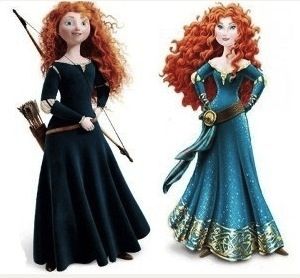Media
Brave New World: Petition Tells Disney to Leave Merida Alone
Disney Makes Over Brave Character Merida, to Cold Reception
Posted May 11, 2013
Brave's Merida and her Disney Makeover June Cleaver and Other Throwbacks. 

Brave's Merida and her Disney Makeover
June Cleaver and Other Throwbacks.
Right up there with these common media stereotypes of women is a group of sexy, pretty, but relatively ineffectual heroines known as the Disney Princesses. We’ve all seen them in the stores, adorning piles of pink products little girls beg for.
A Brave New World? In a world where we think we’ve gone beyond June Cleaver and Princess Peach, moms, dads and other adults who have little girls in their lives were waiting for an exciting role model – someone we could feel good about. We wanted someone who was her own person – an actor rather than an object. Someone whose existence wasn’t based on looking like a supermodel, but on something deeper--like being a real person with admirable qualities beyond her measurements, sultry eyes and big, glossy hair.
Some of us were pleasantly surprised and grateful when Merida, the heroine of Disney’s film Brave, arrived at the theater. Here was a role model we could get behind. Merida was attractive, but she did not look like a runway model. She wore a dress, but she didn’t like it. She was being married off to a prince, but she found a way to use her strength and wits to try to control her own destiny. We wanted our daughters to grow up and be like Merida: brave, strong, resourceful, imperfect but loving.
Makeover Merida Sparks Protest. And then they gave her a makeover. (See: http://shine.yahoo.com/parenting/disney-princess-makeover-sparks-outrage--merida-petition-goes-viral-175251230.html). Someone at Disney decided these admirable qualities in Merida were nothing compared to an improved version whose unruly curls were tamed, whose face was “beautified,” and whose body and attitude turned sexy.
Many people thought this was a really bad idea. The “beautification” and sexualization of Merida didn’t sit well with a lot of parents and observers. And they asked for better from Disney. They wanted to send the message that their work in the film Brave with the character Merida is what’s wanted in today’s world. Those who were outraged believe that the world already has enough sexpots and “beauties” to show our girls, if you like that kind of thing.
It's Just a Story: It Doesn't Matter. If you’re interested in what sexualized images of women and girls does to us, there are a number of good research papers and reports and books out there to tell us about the risks we take when the stories we tell about women and girls is that we’re not people, but eye candy. For example, in a report, the American Psychological Association pointed out how the sexualization of girls and women in the media is damaging, robbing girls of everything from self esteem to healthy sexuality.
Research in my lab has shown that when men are exposed to sexualized, objectified images of women, they become more tolerant of real-life sexual harassment compared to controls who saw professional images of women. In another study, those exposed to women portrayed as promiscuous applied that stereotype to other women – saying that the innocent women were more responsible for their own sexual harassment.
The stories we tell about women and girls do matter. And the pictures we put in our daughter’s minds matter as well.
New Media: New Voices. The good news is that a significant group of us is recognizing this now and is asking for better. News of the Merida Makeover went viral and a petition on change.org asking Disney to keep the original look of Merida was quickly signed by thousands of people.
Real women are not June Cleaver. Real girls are not Makeover Merida. And it looks like people everywhere are asking Disney to update their role models for girls from pretty princess to someone real, strong.. and Brave.
Update
As of this writing, it seems that the petition DID make a difference. It's been reported that Disney "has quietly pulled the redesigned Merida from its Princesses website and replaced it with the original Pixar version. It seems like petitions actually are useful sometimes!"
http://jezebel.com/disney-pulls-sexy-merida-makeover-after-public-backl…
Bibliography
Dill, K. E. (2009). How fantasy becomes reality: Seeing through media influence. New York: Oxford University Press.
Dill, K. E., Brown, B. P., & Collins, M. A. (2008). Effects of Exposure to Sex-Stereotyped Video Game Characters on Tolerance of Sexual Harassment. Journal of Experimental Social Psychology, 44, 1402-1408. doi: 10.1016/j.jesp.2008.06.002
Dill, K. E., & Thill, K. P. (2007). Video game characters and the socialization of gender roles: Young people’s perceptions mirror sexist media depictions. Sex Roles, 57, 851–865.
Ferguson, T., Berlin, J., Noles, E., Johnson, J., Reed, W., & Spicer, C. V. (2005). Variation in the application of the ‘‘promiscuous female” stereotype and the nature of the application domain: Influences on sexual harassment judgments after exposure to the Jerry Springer Show. Sex Roles, 52, 477–487.
Wolf, N. (2002). The Beauty Myth: How Images of Beauty Are Used against Women.
New York: Harper Perennial.
Links
http://www.apa.org/pi/women/programs/girls/report.aspx
https://www.change.org/petitions/disney-say-no-to-the-merida-makeover-keep-our-hero-brave




